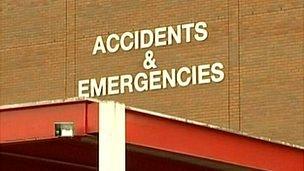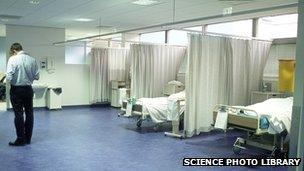National Health Service faces political toxicity test
- Published
- comments

Tories are warned that the NHS reforms could turn toxic in the key Midlands electoral battlefield
"Decontaminating the brand". It's how the Conservatives had defined the challenge facing them in opposition.
Nowhere was this more the case than in the NHS.
This is partly due to David Cameron's family history; partly through his party's commitment to 'ring fence' health spending and, not least, through individual local pledges like the commitment to hold a public inquiry into death rates at Stafford Hospital.
Little by little the Conservatives regained public trust in the figurative 'middle ground' of politics as well as in electorally hyper-sensitive geographical 'middle England'.
Re-toxification?
Stafford, where David Cameron had himself been the defeated candidate in the New Labour landslide of 1997, was one of no fewer than 15 key Midlands marginals which switched to the Conservatives, external in 2010.
So was next-door Cannock Chase, also within Stafford Hospital's catchment area, where the Conservatives achieved a swing against Labour of over 14%.
Had the Conservatives polled across the rest of England as they did in the Midlands, they would have had a working majority.

Stafford was one of 15 key Midlands marginals which switched to the Conservatives in 2010
Winning and retaining public trust on health was and is a key defence against the re-toxification of that Tory brand.
Which is why the escalating row over the government's health proposals, external is not just about the future of the NHS: it is also the stuff of calculated electoral strategy.
If Labour, external can reclaim its traditional high-ground on health, it senses it can develop some much needed momentum in those all important swing seats.
Opposition demands for the government to drop its Health and Social Welfare Bill, external undoubtedly chime with widespread fears that unfettered competition would lead to the fragmentation of the NHS.
These demands also resonate with groups representing health professionals, including GPs, who say they do not want the extra commissioning powers which ministers hope to confer on them.
And Labour does now appear to have overturned the lead held by the Tories over Christmas and the New Year in the opinion polls.
Impact of change
Health is one area where the Liberal Democrats, external are not the government's human shield; this one has the Conservatives' name on it.
Across the West Midlands alone, 100,000 people are treated in hospital, see a GP or a carer every day.
The NHS, external here is responsible for the health care of nearly 5.5 million people at a cost to the public purse of £10 billion.

Health is a policy area which could turn toxic for the Conservatives
But how many of us really understand what the changes could mean in practice?
So long as that hip replacement is completed promptly, to the highest clinical standards and free at the point of delivery, how many people really care about NHS delivery mechanisms?
Whatever the outcome of the anguished debate over the government's Health and Social Care Bill, the strategic health authority in the West Midlands says it must save nearly £2 billion from its existing budgets by 2015.
This is in order to cope with the demands of an ageing population and with the rapidly rising costs of drugs and other 'high-tech' treatments.
Cameron's 'poll tax'?
When electors go to the polls next time, they will do so not only to express their political judgements; they will also be voting as patients, as consumers of this ultimate public service.
Could health yet prove to be David Cameron's poll tax?
This will be our main talking point on this week's Sunday Politics when I will be joined in the studio by:
Margot James, external, the Conservative MP for one of those key marginals, Stourbridge;
Tristram Hunt, external, the TV historian turned Labour MP. He also entered Parliament in 2010, in the safe seat of Stoke-on-Trent Central.
And I hope you will join me too, from 12:00 for the Sunday Politics on BBC One on Sunday, 26 February 2012.
Follow me on Twitter: PatrickBurnsBBC, external